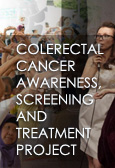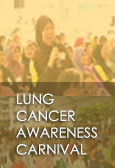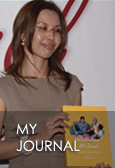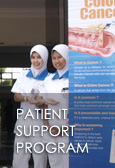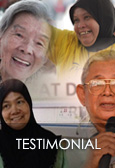Cancer Survivor Gives Back
![]()
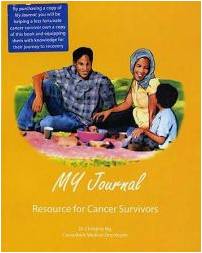
A cancer survivor gives back to his community by translating a cancer guidebook.
BEING a health-conscious person, KT Phong was shocked when he was told he had colorectal cancer five years ago (at the age of 64).
That was probably because he had done everything he possibly could to look after his health. He exercised, refrained from smoking and consuming alcohol, and underwent regular medical examinations since he was young.
“But then I thought, since I already have this problem, I have to solve it,” he says, as we settle down at a outdoor cafe in the park he visits every morning.
This positive outlook has served him well. However, he attributes his survival to the knowledge he has about his disease, and his determination to lead a normal life despite cancer. He went for treatment and continued his daily exercise routine and made sure he ate even though he did not have the appetite.
“A lot of cancer patients I speak to and their families are shocked when they hear about the diagnosis. They do not know what to do,” he says. “Some of them even think that it is as good as being pronounced dead. Actually, it is not that bad. In most cases, cancer can be treated.”
His desire to get the message out coincided with an opportunity to do so when he was asked to translate an English cancer guidebook into Chinese. “As a lot of the information on cancer are available in English, this would help those who only read Chinese get the information they need,” he says.The cancer guidebook, titled My Journal, is a nationwide community service project by The Cancer Advocacy Society of Malaysia (EMPOWERED) that serves as a resource for cancer patients and survivors. Its second edition, now available in English, Malay, Chinese and Tamil, comes in the form of a personal organiser that allows patients or caregivers to file their reports or important articles that may help them in their journey with cancer.
Having had first hand experience with the disease, Phong can relate to many of the tips given in the guidebook. Many of them are the side effects of treatment, like hair loss, mouth ulcers, numbness and the loss of appetite.
However, as everyone is different, he encourages fellow cancer survivors to listen to their doctors’ advice and take steps to care for themselves.
To this end, having good nutrition and exercise is vital, as eating healthily can give the body the nutrition and strength it needs to heal, and exercising may help reduce the side effects of cancer treatment.
Phong, who does light qigong exercises every morning (even when he was undergoing treatment), gives an example, “If you exercise, you don’t feel that bad. You don’t have to do (strenuous) exercises. Sometimes, just walking around will do.”
When Phong was treated for colorectal cancer, only the first edition of the guidebook (available in English only) was available.
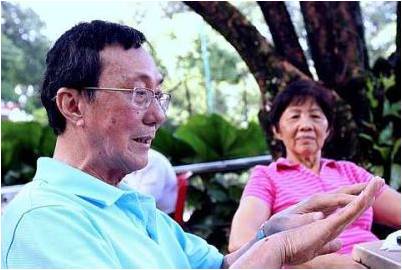
Having had first hand experience with cancer, Phong (left) can relate to many of the side effects of treatment mentioned in the guidebook, My Journal. As he explains some of them, his wife SF Kan looks on.
However, as he benefited from the information in the book, Phong showed his support by agreeing to share his story at the launch of the second edition of the guidebook.
“I just want to let people know that some of the things (that are explained in the book) are usually what cancer patients and their families usually have to go through,” he says.
While doctors may not have the time to explain and discuss everything in detail, patients and their families can make the best of the short consultation by preparing for it.
In the guidebook, basic information about the tests patients may undergo, the treatments that are available, and the effects cancer can have on their personal relationships, for instance, can help patients list down questions to ask their doctors.
Even though journaling may not be every patient’s way of coping with the physical and emotional demands of cancer, Phong says at least the guidebook gives patients some idea about their diagnosis and what they can do about it.
In this case, knowledge can be a good cushion for a patient who has to deal with the shock of a cancer diagnosis.
My Journal (2nd Edition) is available for sale at Pantai Hospital Kuala Lumpur, Sunway Medical Centre Petaling Jaya, Sabah Medical Centre and LohGuanLye Specialists Centre Penang. It can also be purchased directly from EMPOWERED (www.empowered.org.my). For each copy of My Journal sold, a copy will be given free to a less fortunate cancer survivor.



